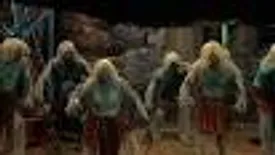H. G. Wells' The Time Machine is a classic sci-fi novella that traces the journey of an unnamed scientist, known simply as the Time Traveller, as he explores a wonderous and distant future. Published in 1895 - nearly two decades before the more traditional science fiction genre had established itself -The Time Machine paved the way for countless science fiction stories to be told within the established parameters of the genre.
The story begins with a group of friends gathered around the Time Traveller in his laboratory, telling stories and enjoying each other’s company. The Time Traveller reveals to them a machine he has been working on, a model of a time-machine capable of taking its user to distant points in time. Later, the Time Traveller invites them to witness the inaugural launch of the machine, impressing his guests and taking the time-machine himself on an unforgettable journey into the future.
Through his travels, the Time Traveller discovers a future world drastically changed from the one he left. Hundreds of thousands of years have passed and the surface of the Earth has been transformed, with an entirely new civilization living on it. The world is completely devoid of humans, with two antagonistic races of creatures - the Eloi and the Morlocks - vying for control. The Eloi, elegant and seemingly carefree, exist in a society of leisure, but are ultimately docile and resigned to exist under the monopolizing control of the Morlocks, who use their brutish strength to menace and intimidate the Eloi.
The Time Traveller learns the horrible relationship between the two races from the Eloi, a relationship of captivity and exploitation, where the Morlocks use their more advanced technology to take parts of the Eloi to use as food. This grim reality combined with the lack of predictability of future situations leads the Time Traveller to realize he must make haste and return to his own time period, a resolution he eventually succeeds in with the help of his time-machine.
The Time Traveller's journey through time is as much an exploration of his own character as a physical journey through the future. Through his struggles and explorations he discovers the true nature of morality and its place within our world, from the cruelty of the Eloi/Morlock affair to the compassion of the wider universe.
In the Time Traveller’s own words: “There is no difference between Time and any of the three dimensions of Space except that our consciousness moves along it.” The Time Traveller’s mission is to explore not only the world of the future but also the means by which one’s character is shaped by their environment and experiences, as well as the choices one ultimately makes. Ultimately, The Time Machine serves not just as an action-packed science fiction adventure, but as a parable of morality and humanity’s actions therein.
The Time Machine was an influential work in its own time, prefiguring many of the science fiction tropes we know today. It stands as a captivating testament to H. G. Wells’ influence on the genre of science fiction. Wells’ masterpiece has been adapted for film and television multiple times, solidifying its place in literary history and inspiring readers to explore the notion of the unknown and contemplate the implications of a seemingly limitless future.

